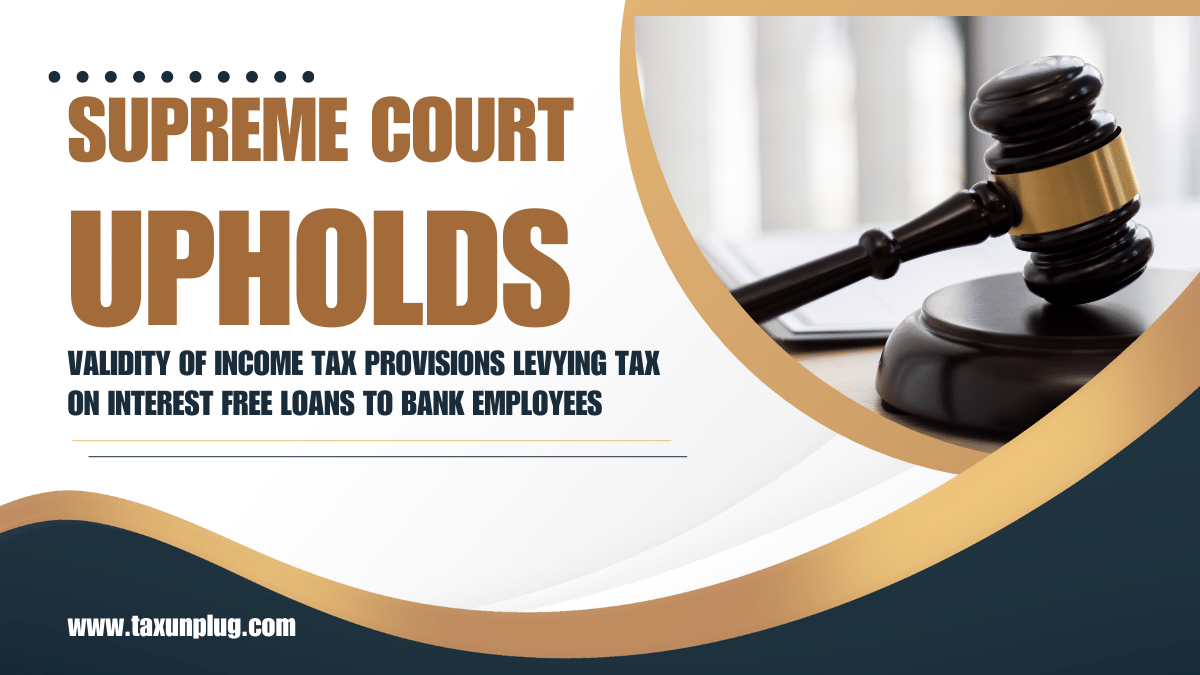SUPREME COURT UPHOLDS VALIDITY OF INCOME TAX PROVISIONS
The Supreme Court has recently ruled on the taxation of interest-free or concessional loans provided to bank employees. The Court has determined that the advantage received by bank employees through such loans is a distinct fringe benefit exclusive to them. This benefit is classified as a ‘perquisite’ and is therefore subject to taxation.
The case revolved around the analysis of Section 17(2)(viii) of the Income Tax Act and Rule 3(7)(i) of the Income Tax Rules. Various petitioners, such as staff unions and officers’ associations from different banks, contested the validity of these regulations, presenting arguments against the taxation of interest-free or concessional loans given by banks to their employees.
Section 17(2)(viii) of the Act defines ‘perquisites’ to include ‘any other fringe benefit or amenity’, as prescribed. Rule 3(7)(i) of the Rules stipulated that interest-free/concessional loan benefits provided by banks to bank employees shall be taxable as ‘fringe benefits’ or ‘amenities’, if the interest charged by the bank on such loans is lesser than the interest charged according to the Prime Lending Rate of the State Bank of India.
The petitioners contested the provisions based on the excessive and unguided delegation of legislative authority to the Central Board of Direct Taxes (CBDT). They further contended that Rule 3(7)(i) was arbitrary and contravened Article 14 of the Constitution.
Nevertheless, the arguments put forth were ultimately dismissed by the Supreme Court, which upheld the provisions as valid. The Court stressed the importance of ensuring that any delegation of legislative authority remains within the confines of the original legislation and does not result in a relinquishment of crucial legislative responsibilities.
The Supreme Court held that Section 17(2)(viii) provided sufficient guidance to the CBDT for framing rules, and Rule 3(7)(i) was consistent with the legislative policy and standards laid down in the Act. Regarding the benchmarking of interest rates to the PLR of SBI, the Court deemed it rational and non-arbitrary. It noted that SBI’s interest rates significantly influence those of other banks and that using a single benchmark ensured consistency and clarity in taxation. The Court concluded that Rule 3(7)(i) was based on a fair determining principle and did not violate Article 14. The Supreme Court’s decision upholding the taxation of interest-free/concessional loans to bank employees reaffirms the legality of Rule 3(7)(i) under the Income Tax Rules. The judgment provides clarity on the taxation of fringe benefits and underscores the importance of consistency and fairness in tax legislation.
To download the official order, click here.
“The site is for information purposes only and does not provide legal advice of any sort. Viewing this site, receipt of information contained on this site, or the transmission of information from or to this site does not constitute an attorney-client relationship.

